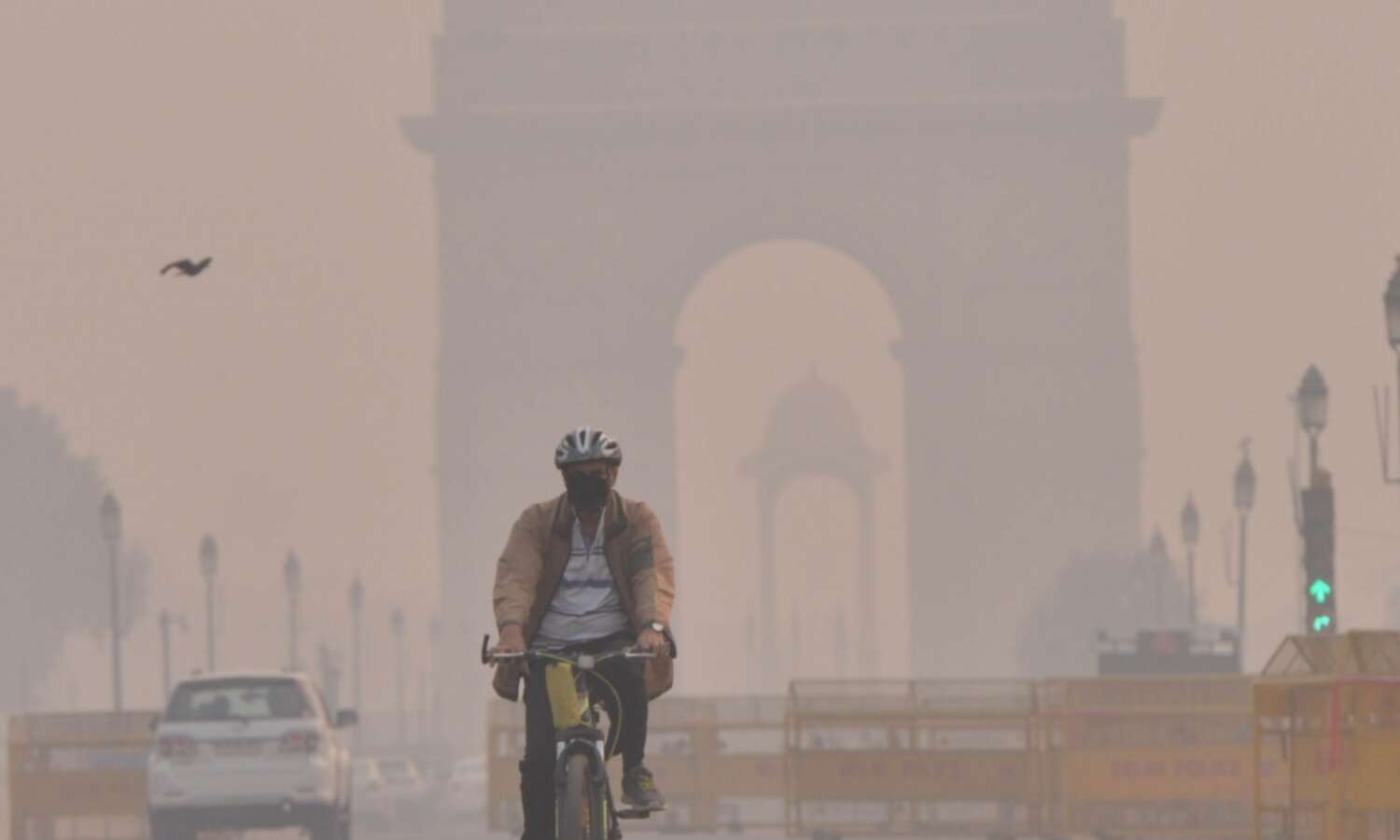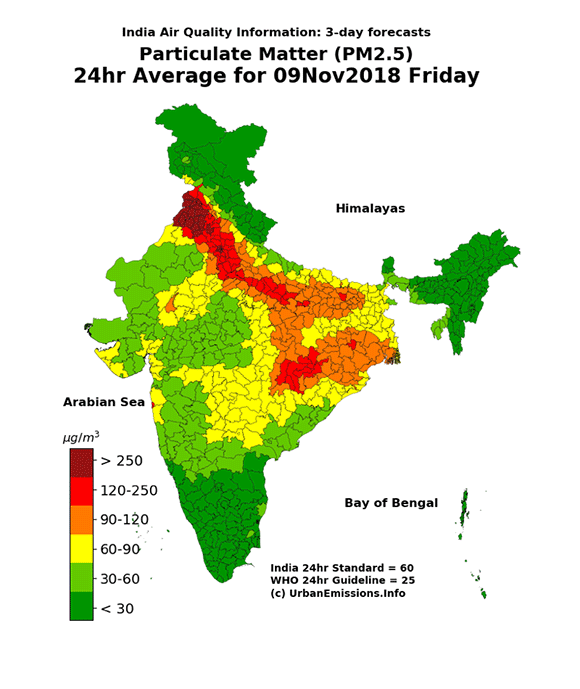Day After Diwali, Toxic Smog Over 41 Indian Cities

New Delhi: About 41 cities, mostly in north and central India, experienced “poor” to “severe” air quality on November 8, 2018, a day after Diwali, according to government data.
Seven cities, including Noida, Faridabad, Patna and Lucknow, recorded worse air than Delhi, according to the Air Quality Index (AQI) bulletin, which records a 24-hour average and is released every day at 4 pm by the Central Pollution Control Board (CPCB). AQI is a number used by governments to communicate to the public how polluted the air is. AQI of 100 is considered acceptable in India.
The plunging air quality after Diwali also took on religious overtones, with some arguing that a Hindu festival was being unfairly criticised and smoke from firecrackers is not the reason for Delhi's increased air pollution, and there is no evidence that the smoke had any long-term effects.
I wish you all very happy Diwali.
— Prof. Hari Om (@Prof_Hariom) November 7, 2018
Let all #Hindus resolve today to defeat anti-#Bharat forces & convert India into #HinduRashtra the process for which gained momentum in 2014.
Today is also the day to burst #Firecrackers to show SC its place.#Diwalihttps://t.co/kaMY18YVvq
PIC 1: AQI on 5th November (two days before Diwali)
— The Lazy Lawyer (@BBTheorist) November 8, 2018
PIC 2: AQI on 8th November (today)
Today's AQI is almost half of what it was on 5th November. Are we still blaming Diwali and crackers for air pollution in Delhi?
Courts, media, activists and govts should must take note. pic.twitter.com/TVcc9DvgNS
Madam Give up on Generators, ACs, Diesle Cars and AC lobbies of ur studios. One day of Diwali will have no affect. By the Why Pollution is disscused only on Diwali. Saal Bhar Pollute karo Diwali ko blame karo #FakeActivism
— #SaveSabarimalaTradition (@indomitablesoul) November 8, 2018
"This is absolute nonsense and away from reality," Arvind Kumar, chairman of the Centre for Chest Surgery at New Delhi's Sir Ganga Ram Hospital, told IndiaSpend. "There are ample data and literature to prove that every time there is a spike in PM 2.5 it leads to increased respiratory and cardiac mortality."
"The air in Delhi is unfit for human living," said Kumar. "OPDs (out patient departments) are flooded with people with breathing problems and irritation in their throats. The number of casualties coming in because of heart failures has increased. It is not only the lung that is damaged by polluted air. There is ample literature available to confirm all of this, and if anybody is saying otherwise, they don't understand the subject and are driven by commercial, political or religious interests. These interests have blinded them."
Indeed, studies suggest that exposure to even brief spikes in pollution could increase mortality.
Short-term exposure to air pollution was seen to cause premature deaths among the elderly, IndiaSpend reported on January 19, 2018. For each 10 µg/m3 daily increase in PM 2.5, the daily mortality rate increased by 1.05%, according to this December 2017 study by the Harvard T H Chan School of Public Health at Harvard University.
Delhi, currently regarded the world’s most polluted city, recorded “very poor” air with an AQI of 390, as per the CPCB bulletin.
World's three most polluted cities at the moment are all in India.
— Iain Marlow (@iainmarlow) November 7, 2018
And, you guessed it, Delhi is the worst city for air pollution on Earth. pic.twitter.com/SFUIOrq6Qq
Wazirpur in central Delhi was the most polluted area in the city with particulate matter (PM) 2.5 readings crossing 4,000 µg/m3 at 2.05 AM on November 8--66 times the national safe air standard of 60 µg/m3. PM 2.5 are air-borne particles 30 times finer than a human hair and can sicken or kill people by entering human lungs.
After 2am, Wazirpur still the most polluted in Delhi on Diwali according to DPCC real-time data. The finer PM2.5 clocked 4591mg/m3, more than 76 times normal standards, while PM10 data is missing @TOIDelhi #HappyDiwali #AirQuality #Delhi #DelhiPollution pic.twitter.com/MgitnbNAjq
— Ritam Halder (@ritam_de_scribe) November 7, 2018
Firecrackers worsen already toxic air
Firecrackers on Diwali evening added to already deteriorating pollution levels across Delhi. In many areas of India’s capital, monitors showed pollution levels peaking between 8-10 pm, during which time the Supreme Court allowed firecrackers.
I think we can safely say that the restriction of fireworks to 8-10 pm has only confirmed the huge impact they can have on local air quality, and reinforces the call for a complete ban. Look at those spikes just around that time! pic.twitter.com/Vx70JH9Gvy
— Bhargav Krishna (@bhargavkrishna) November 7, 2018
About 5 million kg of firecrackers were estimated to have been burnt in Delhi this Diwali, despite a Supreme Court ban. The city has not seen a single day of safe air for more than a month, as per IndiaSpend’s analysis of air quality data of Delhi’s 37 automatic air quality monitoring stations between October 1-November 6, 2018.
In terms of 24-hour averages, about 41 cities in India recorded poor-to-severe level AQIs.
Faridabad recorded the worst air with the 24-hour average AQI reaching 455, followed by Noida with an AQI of 432. Lucknow, Patna and Ghaziabad recorded “severe” air with the AQI at 412, 427 and 422, respectively. An AQI of 100 is considered acceptable.
Source: Central Pollution Control Board

Source: Central Pollution Control Board
Northern cities will continue to have poor air quality
Most of the North Indian cities we mentioned are not likely to breathe safer air over three days to November 11, according to an-all India forecast of PM 2.5 levels by Urban Emissions, a non-profit research group. The air will clear up only after November 10, 2018, according to the forecast.

Update: This story has been updated to incorporate the view of Arvind Kumar, Chairman of the Centre for Chest Surgery at New Delhi's Sir Ganga Ram Hospital.
(Tripathi is a principal correspondent with IndiaSpend.)
We welcome feedback. Please write to respond@indiaspend.org. We reserve the right to edit responses for language and grammar.


